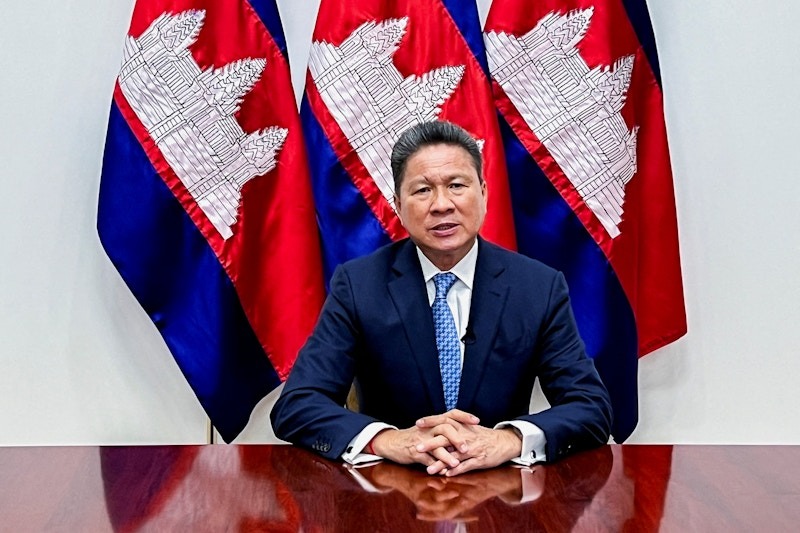On 31/7, US President Donald Trump signed an executive order adjusting reciprocal tariffs on goods from dozens of trading partners, ranging from 10% to 41%. The new tariffs are mostly equal to or lower than those announced on 2/4.
Following the White House announcement, Cambodian Deputy Prime Minister Sun Chanthol thanked Trump. Cambodia's import tariffs were initially set at 49% but are now 19%. He said the reduction will protect the garment and footwear industries, crucial to the Cambodian economy. "This will have a huge impact," he said.
Cambodia enjoys a large trade surplus with the US. Official data shows that exports to Washington accounted for over one-third of Cambodia's total exports in 2025. Under the agreement, Air Cambodia agreed to purchase 10 Boeing 737 MAX 8 aircraft, along with 10 other aircraft.
 |
Cambodian Deputy Prime Minister Sun Chanthol. Photo: Reuters |
Cambodian Deputy Prime Minister Sun Chanthol. Photo: Reuters
Thailand also welcomed the new US tariffs. Finance Minister Pichai Chunhavajira wrote on X, "The 19% import tariff reflects the strong friendship and close partnership between our two countries." This rate is significantly lower than the 36% announced by the US in April.
Last year, the US was Thailand's largest export market, accounting for over 18% of its total exports. Chunhavajira believes the tariff reduction will strengthen Thailand's global competitiveness, boost investor confidence, and create economic development opportunities.
Meanwhile, with a 10% tariff, Australia is among the countries subject to the lowest tariffs when exporting goods to the US. It is also one of the few countries with which the US has a trade surplus.
"We are in the best possible position under the import tariff regime, but we continue to call for the complete removal of this tariff in a free trade agreement," said a spokesperson for Australian Trade Minister Don Farrell.
Last week, Australia eased restrictions on US beef imports. However, Prime Minister Anthony Albanese said this was a long-considered move unrelated to the tariff negotiations.
Meanwhile, its neighbor, New Zealand, saw its tariffs increase from 10% to 15%. "The first step will be direct negotiations with the US. We have had many very positive discussions," New Zealand Trade Minister Todd McClay told Radio New Zealand on 31/7.
Taiwan (China) leader Lai Ching-te affirmed that the 20% tariff imposed by the US on its goods is only "temporary." Taiwanese officials will complete the final stage of negotiations to reach a more reasonable rate. In a post on his personal page, Lai said the tariff could be further reduced once the agreement is finalized.
On 31/7, Trump also signed a separate executive order raising tariffs on Canadian goods from 25% to 35%, applying to products not covered by the US-Mexico-Canada Agreement (USMCA). The White House cited Canada's failure to stop fentanyl smuggling into the US and its "retaliatory and uncooperative" actions as reasons. Trump had previously complained that it was "very difficult to negotiate" with Canada after its support for Palestine.
Prime Minister Mark Carney's office has not yet commented on Washington's move. In June, Carney said that if the two countries did not reach an agreement before 1/8, Canada could impose retaliatory tariffs on US aluminum and steel.
On social media, Ontario Premier Doug Ford immediately called on the government to "retaliate against America's 50% aluminum and steel tariffs" after Trump announced the new reciprocal tariffs. In March, he threatened to stop selling electricity to the US in retaliation for its import tariffs.
"Canada is America's number one customer. The government needs to make the most of its leverage and stand firm against the tariffs imposed by President Trump," Ford wrote.
Ha Thu (Reuters, CNBC)












